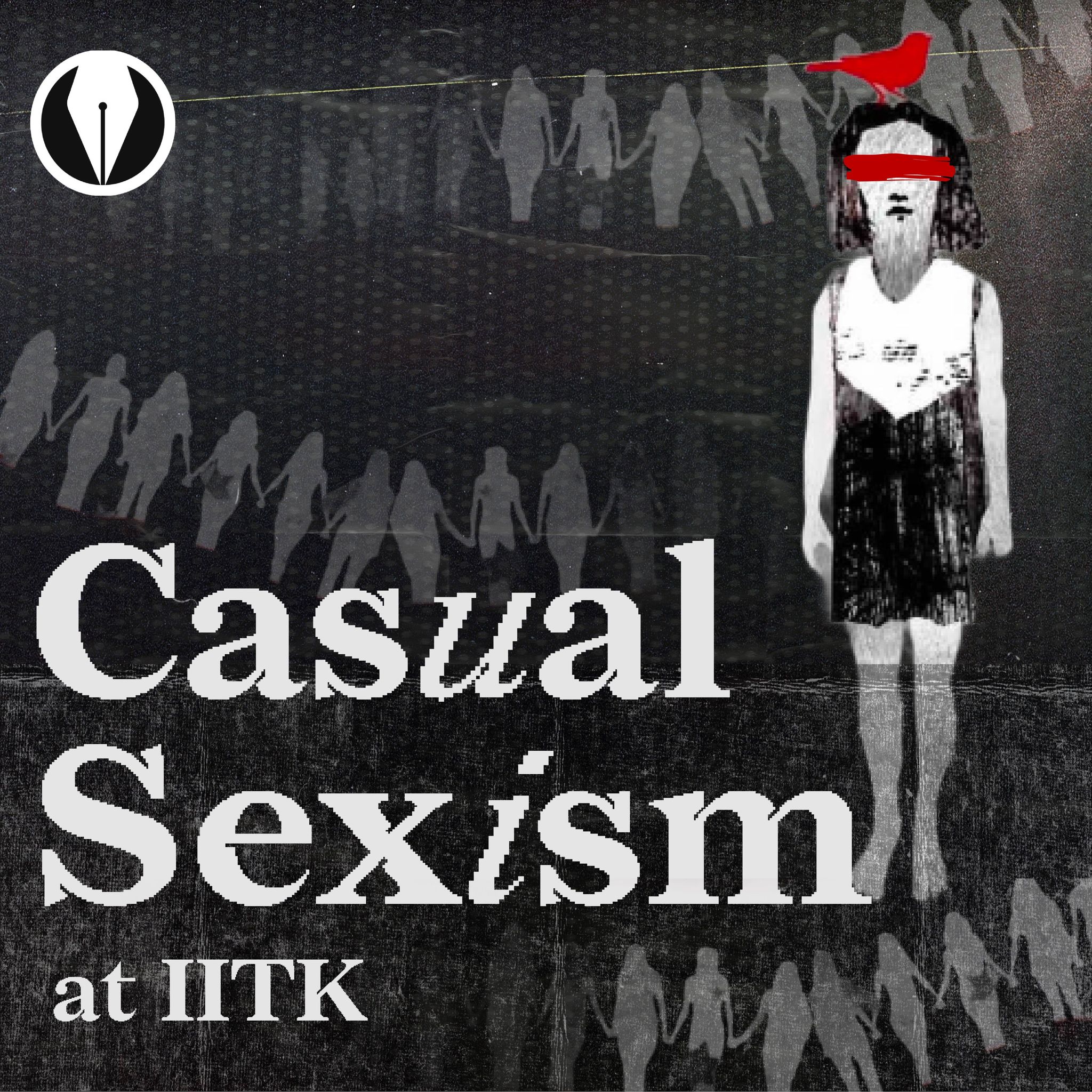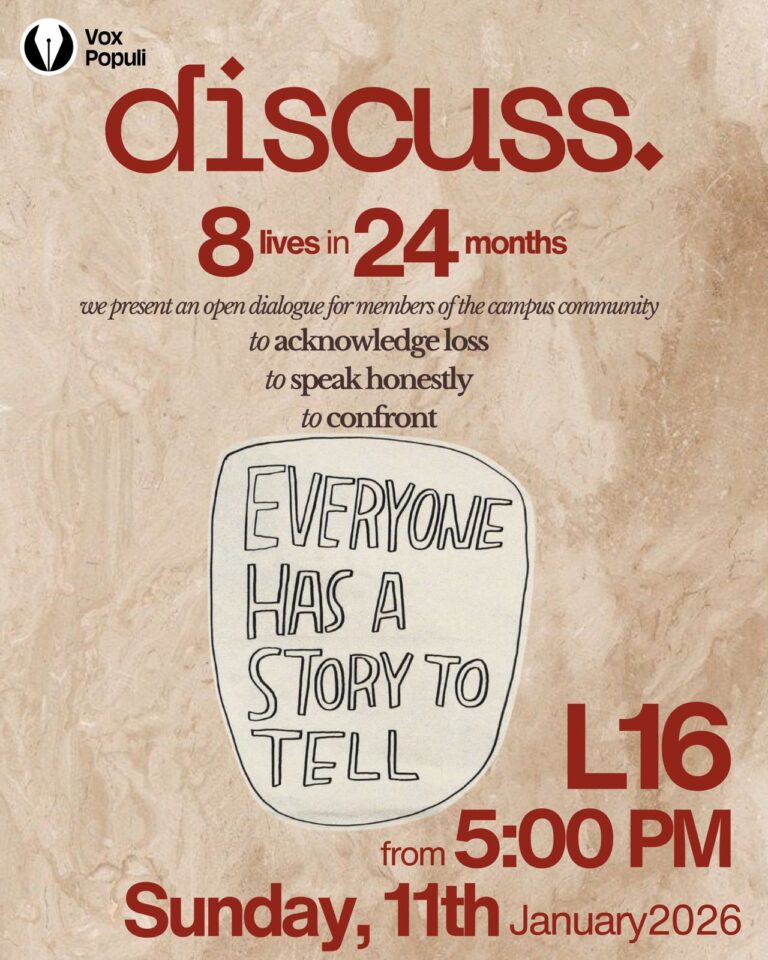While on the one hand we see a recurrent narrative about the inequality in college cutoffs, internships and placements; on the other hand are apprehensions about casual sexism, unwarranted doubts about one’s competence and jeopardised opportunities. Buried under this chaos are also the unheard complaints of the non-binary for whom even acknowledgement of their problems – keep aside resolution – seems to be an uphill task.
Vox team conducted an anonymous survey to dive deep into the issue and know what the campus thinks. The survey received 494 responses, with about 75% male, 22% female, and 3% non-binary responses. To present the complete picture on the issue, we talked to the Women’s Cell, alumni, Gymkhana executives and a few individuals who reached out to us with their cases. Here are the findings from the survey and our conversations:
What does the Male Population Think?
A significant portion of the male respondents raised concerns regarding the reservation for female students at colleges and alleged that females are favoured by TAs and tutors. The woes of disadvantages of female favouritism extended to club recruitment and company hiring as well. Furthermore, about 40% males found the Women’s Cell unapproachable, according to our survey. Some comments that supported these notions were:
“Selection process at various fests, teams, interns and senior interaction are generally ‘humble’ to girls and not so to guys.”
“Girls are preferred as interns even when they have less skills. Girls get favoured in clubs and fests.”
“I was denied a position in a department in Gymkhana just because they had too many boys there and wanted a girl to have a better representation. I could have done the job better, and there was no female-specific job for which they absolutely needed a female in the committee.”
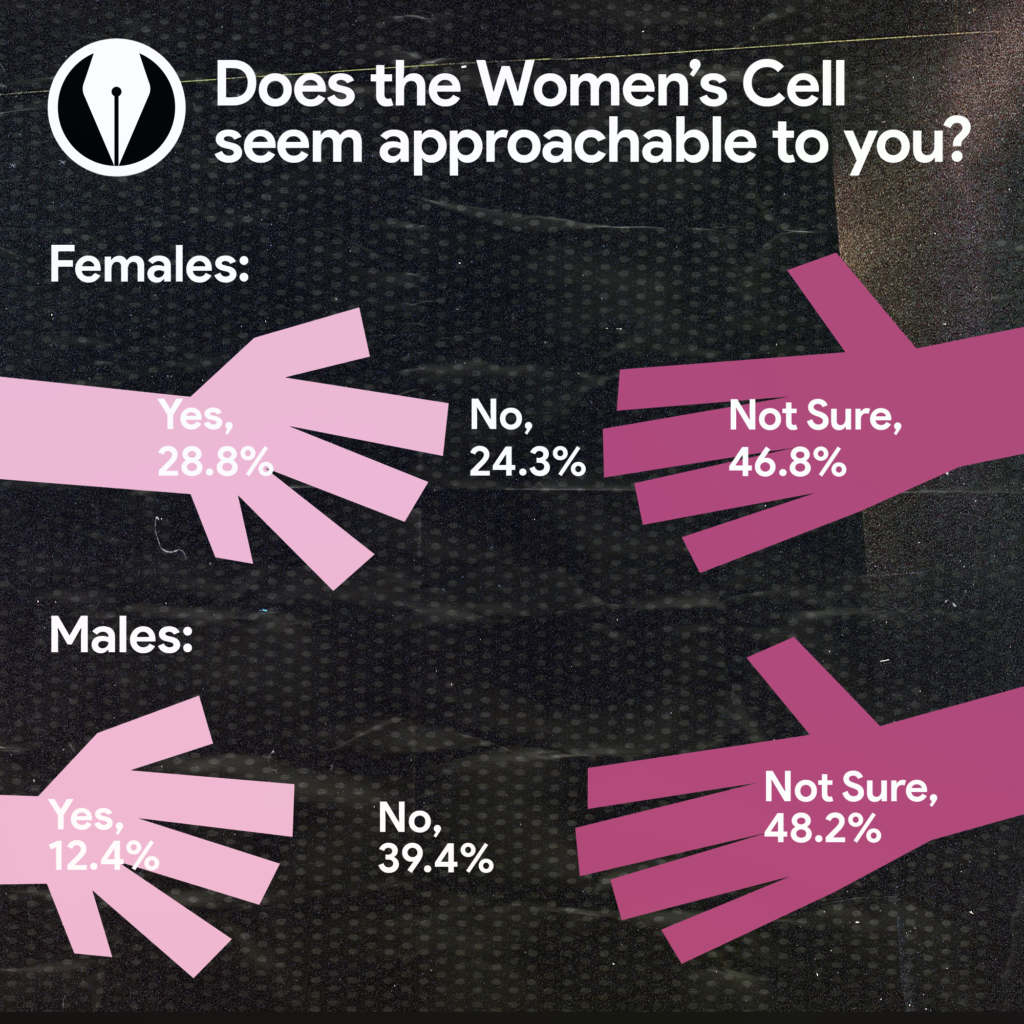
Multiple respondents alleged lack of cognizance in cases of harassment of boys. Invasion of personal space in hostels and the shame associated with pointing it out were some common issues. Further, respondents expressed disappointment regarding the lack of support from the Women’s Cell in such cases.
“It is very common amongst guys to invade each other’s private space or not respect one’s boundaries. I am insecure about my body and am really sensitive if someone touches me. It has happened multiple times, and I get very uncomfortable. Though it is ingrained in the hostel culture and nearly impossible to change, I wish that guys started respecting each other’s physical boundaries and not shame others for this.”
“The only difference is that when males are bullied, they are said to have fun, as they are mostly bullied by other men. But when it comes to women, bullying becomes harassment.”
Moreover, the male population overwhelmingly believed that the Women’s Cell is biassed towards females. Many respondents expressed that they are vulnerable to being subjected to false implications through the Women’s Cell.
“A woman could harass me for some personal problem with illogical points “
“Some women were openly sharing derogatory stickers via WhatsApp, but I was unable to, as a boy. I know there is a Women’s Cell to advocate for them. We boys have nothing. Some say that the Women’s Cell also works for men, but the name suggests otherwise. If you wanna fight sexism, start by changing the name of the Women’s Cell to Students’ Cell. You can’t be so naive that you think only women get assaulted.”
A few male respondents were also cognizant of the difficulties faced by their female friends. They highlighted how sometimes sexism was a common element across male-only groups.
“It is peak intern season – two friends get shortlisted in one firm and then, the girl candidate gets selected, so the other guy friend tells me that the girl was preferred just because she’s a girl. At that very moment, he starts demeaning her in some sense and downplaying her ability to get selected.”
“There was a GBM in my hall, and the senior was a misogynist who commented on how girls don’t deserve to be in competitions like SnT code.”
Let's Hear the Female Population
In response to why they felt the campus has prevalent sexism, many female respondents shared that they regularly confront sexist comments and remarks. Comments like “You’ll definitely get a job”, “Hall 6 won only because boys helped them” and “You got here because you were a girl” made them feel inferior and unworthy.
Multiple female students shared with us instances wherein the Gymkhana, the Senate or particular coordinators of certain clubs believed that girl students are incompetent of leading. In particular, respondents alleged that girls applying for festival coordinators are reasoned off by saying that the vendors won’t listen to a girl.
Another female student we talked to alleged the current President, Students’ Gymkhana for passing sexist remarks casually. She told us,
“In a conversation discussing a potential vendor, I informed the President, Student Gymkhana, that the vendor had no degree in management, no diploma with no working experience. To which he responded – ‘sounds like hall 6 residents!’ “
Both male and female students also pointed out cases of some Professors passing sexist remarks in classes. In one such incident, a Professor said, “In developed countries, women work and take care of their physical appearance. Housewives in India are not only fat but also ugly and spend their entire day watching TV serials.” He also went on to say that a female sanitary worker in the western world looks better than bollywood heroines. Many respondents felt these remarks were not only sexist but also made them uncomfortable.
Incidents like these, especially involving people in positions of power, show how deeply rooted sexism is in our ‘culture’. However, it must also be noted that around 32% of girls feel that the campus is not sexist.
Another serious concern raised by the female community was uncomfortable behaviour of guys in front of them. Many girls told us that it is challenging to have a neutral conversation with a boy as most seem driven by obscure intentions. Unnecessary attention that girls receive was disturbing for multiple respondents.
On the issue of alleged favouritism of females at IITK, some respondents found it vital so as to encourage more women to get opportunities in STEM. The same was said for club recruitment.
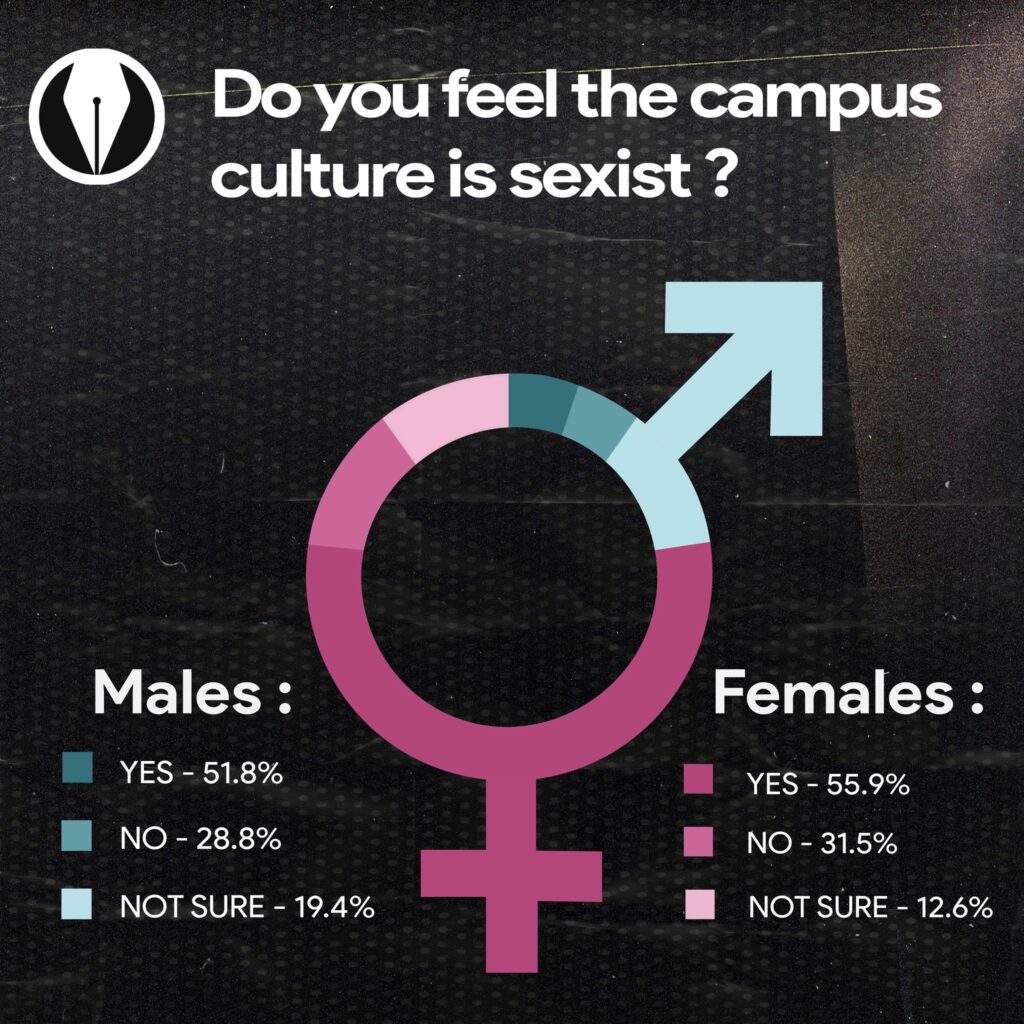
Hearing out the Non-Binary Population
In the survey, non-binary conforming gender responses constituted 3% of the responses received. Out of them, 50% felt unsafe expressing their gender identity on campus.
Despite conducting several gender identity sensitisation sessions to promote healthy interactions in the campus community, a third of the respondents affirmed that there were incidents where people mocked them for their identity. They felt that their gender identity posed a problem in campus interactions and during internship and placement drives. Two-thirds of the respondents thought that they were at a disadvantage because they did not conform to any of the binary genders.
Another concern that came up recurrently in our investigation echoed here: The name Women’s Cell for a gender-neutral support body was alienating for many.
What does the Gymkhana say?
The Chairperson, Students’ Senate, agreed that sexism existed in many subtle forms on the campus. For example, he pointed out that many clubs were not ready to take rooms in the Girls’ Hostels merely because they found it inconvenient. While in contrast, many clubs have their rooms in boys’ hostels.
Kartikeya Dhakad, the ex-Chairperson Students’ Senate, also noted that the location of clubs’ and teams’ rooms in the boys’ hostels, especially those of the SnT council, impedes female participation due to reduced accessibility.
To better understand the scenario, our team analysed the participation of students in Councils and the Senate. Based on the ratification list, female students made less than a quarter of the ratified position holders across councils, Senate and festivals. In particular, SnT Council, Students’ Senate and Festivals fared worse than other student bodies. It may however be noted that the following data is based on the ratification lists, which does not entirely capture how many females and males actually participated in club/fest activities.
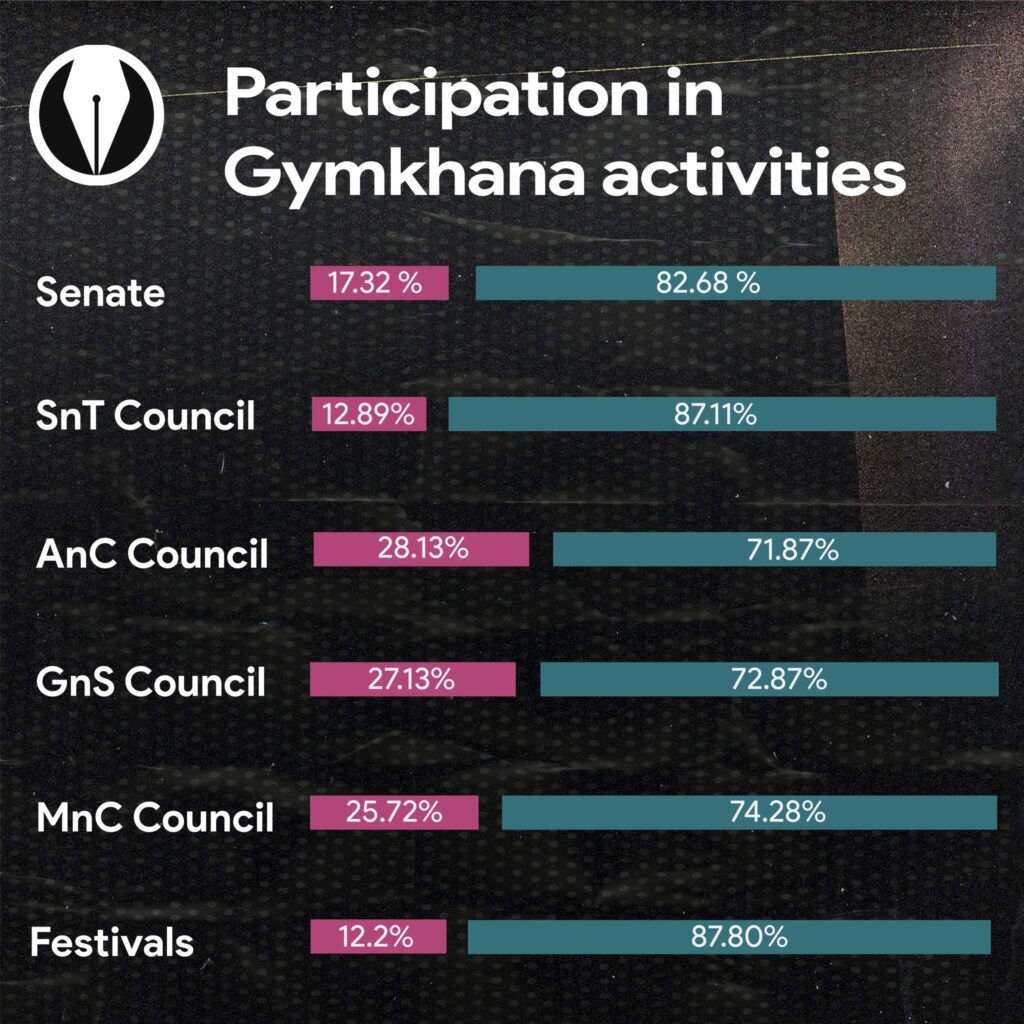
Multiple executives pointed out that one of the primary reasons for the reduced female participation in the Senate and Councils is the lack of culture and exposure within the Girls’ Hostels.
“There is relatively less interaction among girls, and people live discreetly in groups. This low interhall interaction causes a lack of community support and exposure and hence deteriorated will to contest. In SnT, in particular, expertise is required, so lack of exposure plays a big factor compared to MnC” – Chairperson, Students’ Senate
Kartikeya (ex-Chairperson, Students’ Senate) however pointed out that the low percentages in the Senate could be a one-time event, and we might see an increase in the future. He emphasised that the quality of people participating in a particular election is crucial in determining female participation in the Senate. He shared how during his tenure, some people were against the appointment of a female Chief Election Officer. He recounts hearing: “Vo ladki hai, voh ese decisions le hi nahi sakti kabhi”. On questions on the Women’s Cell and the need for a gender cell, Kartikeya responded that a diversity cell exists although it is dysfunctional.
The Recruitment Issue
To fact-check the recurrent narrative about girls being favoured over boys during internship and placement seasons, we analysed the internship and placement data (for Phase 1 in 2022-23). We found that the female to male recruitment ratio was 1:3.5. To put it in perspective, the female to male population ratio in IITK is about 1:4.28.
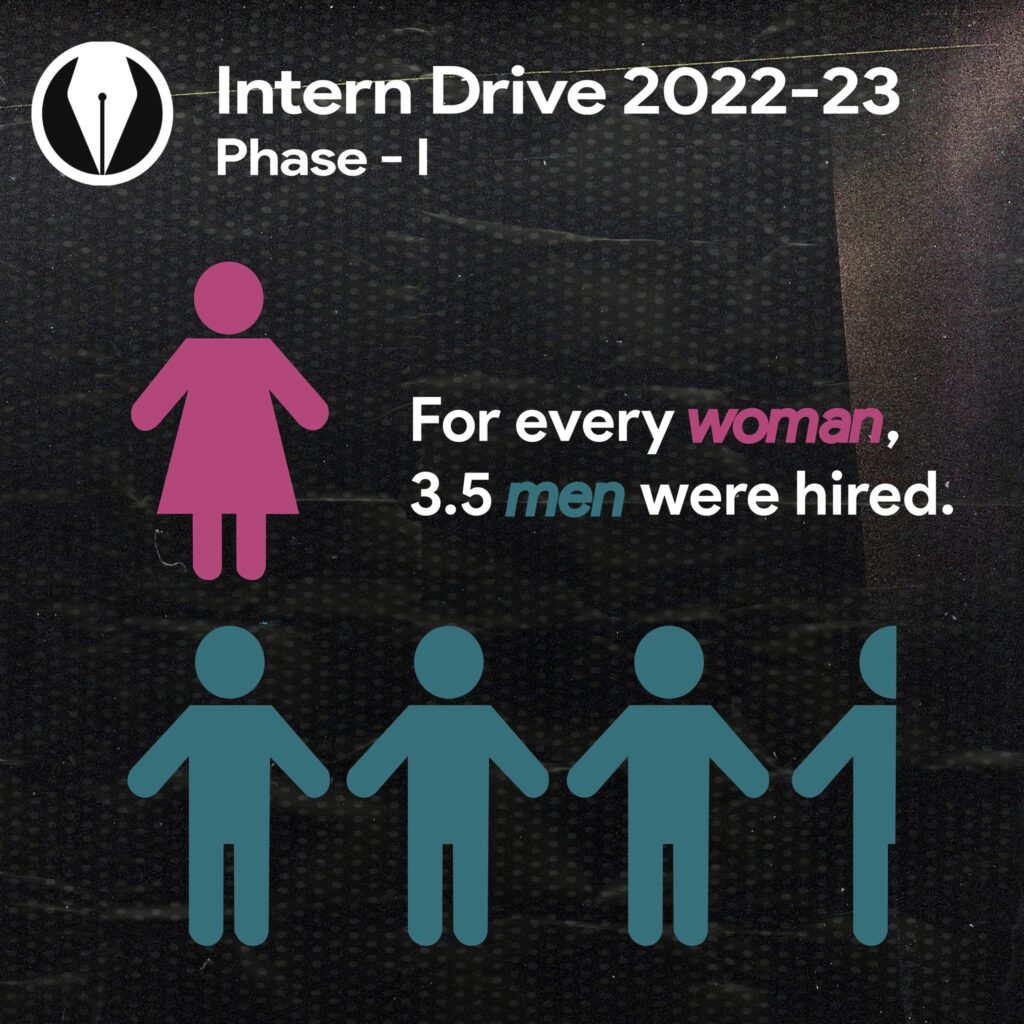
Some of the recent alumni we talked to said that the narrative is created because some companies tend to ‘overcompensate’ for the lack of women in core engineering fields. Additionally, they said the issue is hyped by the people who are not selected and tend to find loopholes.
“Companies won’t hire someone just because they are girls. They also need to pay them. They are not hiring eye candies, they are hiring people.”
What does the Women's Cell Think?
To know the Women’s Cell’s perspective, our team talked to Professor Sarani Saha, the current Chairperson, Women’s Cell and Professor Jonaki Sen, the ex-Chairperson, Women’s Cell. They pointed out that sexism is prevalent in all stratas of the society, and the student community at IITK is no different. We are supposed to put our father/husband’s names in almost all government forms – this, they said, is an example of the systemic nature of the issue.
Prof. Jonaki Sen had this to say when asked about the cause of such prevalent sexism on campus:
“One of the common reasons why we see such sexist ideas propagate inside the campus is because we all come from different backgrounds. For example, if the household in which we grew up had discrimination against women, we would internalise that kind of attitude and ask for some level of unlearning to happen.”
On the significant lack of female participation in SnT and GnS councils compared to AnC and MnC councils, Prof. Sarani Saha suggested that this could stem from societal biases that women are better suited for specific roles and activities opposed to others. The skewed gender ratio in such councils could also act as a deterrent to their participation. She highlights that healthy participation is required for gender-inclusive policy formation and increased gender sensitisation. Further, in any setup, an individual feels more inclined to engage if there are companions and role models that they can relate to.
We also talked to the professors about how supernumerary seats, lenient cutoffs for girls and diversity hiring in internships and placements contribute to the prejudice that girls are not at par with boys or are inferior. Prof. Jonaki Sen claimed that such policies are required to patch the ‘leaky pipeline’ and improve female representation. By ‘leaky pipeline’, she referred to the gradual reduction (or ‘leakage’) in the number of female students from undergrad to PhD levels and further in faculty positions.
However, Prof. Sen said that such policies need to be implemented with a grain of salt. She believed that the benefits of such policies should be limited to first-generation college-going females. Suppose the mother is already doing well professionally; in that case, the daughter probably should not be allowed to avail of the policies to the same extent.
On the issue of perceived bias of the Women’s Cell in favour of the women (as apparent from our survey), Prof. Jonaki Sen clarified that as an awareness wing, the Women’s Cell caters to the needs of students across all genders and sexuality. And that Women’s Cell is meant solely for females is a misconstrued idea. Furthermore, she clarified that a harassment rule mandates equal privilege in approaching the ICC (Internal Complaints Committee) for both males and females in cases of harassment. Prof. Sarani Saha, welcomed the idea of renaming the Women’s cell to a more gender-neutral name and said that the cell would consider the same.
As per our survey, the major deterrent in approaching Women’s Cell were prevalent reputation about the inaction of Women’s Cell in major cases and the risk of the victim’s identity being revealed. To this, Prof. Sarani Saha responded, “In my tenure as an ICC member (Internal Complaints Committee) for three years, I have seen complaints being treated with utmost urgency – barring the COVID-induced delays in procedures. This happens because we work on a deadline to close complaints within three months of filing.”
Thereby, she said that the reservations about the inefficiency of the Women’s Cell and the ICC are unwarranted. Moreover, she claimed that the confidentiality of the victim’s identity is respected throughout the process and stressed on the dire need for victims to complain as it sets a precedent for the accused.
Prof. Jonaki Sen told us that the number of complaints of sexual harassment has gone up, which shows that more people are cognizant of the importance of speaking up. “This is a massive milestone for Women’s Cell as an educating body. To improve the effectiveness of sessions, the Cell is also planning to hold cognisance sessions department-wise,” she added.
According to both the faculty members, the biggest challenge for the Women’s Cell is the abysmal participation of campus residents in the awareness sessions organised. Prof. Sen suggested making attendance compulsory for students as well as faculty members in department-wise awareness sessions. Prof. Sarini Saha highlighted the use of social media to gain more traction and plans to use it to create greater awareness on such issues.
In conclusion, the question of sexism on campus is nuanced and multi-faceted. Measures taken in the name of fighting sexism are often seen as sexist by the other side. But two things are clear from our study: one, our merit island is far from ideal – sexism is deeply rooted in our campus community; two, we need more public conversation around sexism. For we are still seeking consensus on crucial questions like: is reservations for females or diversity hiring sexism or anti-sexism? Are ideas of ‘representation’ and ‘equality’ opposite ends to a spectrum or consistent with each other?
Written by: Chetanya Bhan, Shreya Nair, Tanuja Kaleli, Utkarsh Agrawal, Zainab Fatima
Edited by: Bhavya Sikarwar
Design Credits: Manasvi Jain




